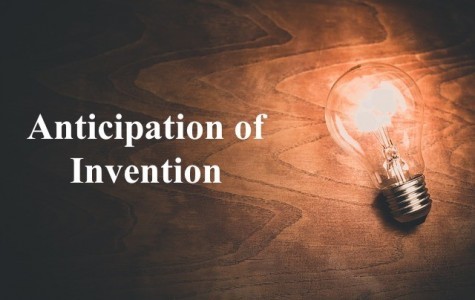This article is written by Swati K, pursuing a Diploma in Intellectual Property, Media and Entertainment Laws from LawSikho.com. Here she discusses “Anticipation of an Invention in India.”
Table of Contents
Introduction
For reaping the monetary fruits of the plant called invention, it’s crucial that the Inventor get a Patent for it. A patent is a protection given to the Inventor. In other words, it is the sole right given to the Inventor to exploit his Invention, in any way, in order to make monetary profits out of its sale.
New is great and old loses craze. Nobody (well most people) likes to buy old car designs, or wear old designs of apparels, or read a story plot that has already been read. Old or pre-existing holds less to no value. The desire for New is unquenchable.
Similarly, in Patents too, the law avoids granting patents to inventions that have been already known, the ones that lack novelty. The ones that have been anticipated. This article would attempt to answer all these questions and trace all the provisions related to the Anticipation of an Invention in India.
What is an Invention?
An Invention is the creation of something new that hasn’t existed before. Section 2 (1) (j) of The Patents Act, 1970 defines an Invention as “a new product or process involving an inventive step and capable of industrial application”.
The 5G network can be called a new invention. Smart Food Labels, the process of turning plastics back into fuel can be called inventions. An invention, thus, literally means “finding out something which has not been found by others”.
Concept of Novelty and its Importance in an Invention
The Merriam Webster Dictionary defines novelty as “something new or unusual”. Novelty is the quality of being original, unusual or unique. It is an important parameter to assess the patentability of any invention.
If an Invention is not novel, there is no point in granting it a patent and the exclusive right of exploitation. If something doesn’t add more value than what already exists, there is no point in placing it on the Pedestal of being “Patented”.
What is Anticipation of an Invention?
The Patents Act, 1970 nowhere defines Anticipation. Sections 13, 29 to 33 of the Act provides provisions in respect of Anticipation.
Merriam Webster defines anticipation as “a prior action that takes into account or forestalls a later action.” In general terms Anticipation means an expectation or a Prediction.
In law Anticipation means the prior knowledge of an invention by means of a prior art or publication. It is the disclosure of the Invention either by the inventor himself or a person authorized by him, way before the application for the Patent is made. This disclosure could be by way of sale, prior publication or public use.
Section 2(1)(l) of the Act defines New Invention. According to it “new invention” means any invention or technology which has not been anticipated by publication in any document or used in the country or elsewhere in the world before the date of filing of patent application with complete specification, i.e., the subject matter has not fallen in public domain or that it does not form part of the state of the art.
Section 13 of the Act provides that a search for anticipation will be made by the examiner among the specification filed in pursuance of application made in India on or after 1st January, 1912 but before the date of filing of the applicant’s complete specification.
For an invention to be patentable, it must be different from all published articles, known techniques, and marketed products. The invention must not already have been made available to the public, when the filing of the application for a patent takes place.
If an Invention is not Novel, it is said to be anticipated. Anticipation renders the so-called Invention as merely a copy or counterfeit of the original. Here Novelty actually means “new compared to prior art.”
Grace Period in Anticipation
Grace period in Anticipation is the period within which, if an application of patent is filed, it would not be considered as Anticipation.
In other words, it is a specific period of time preceding the filing of a patent application, during which certain types of disclosures of the invention (for which the patent application is filed) do not destroy its novelty.
Grace period simply protects the inventor from unauthorized, or (in certain countries) authorized, disclosure of an invention before a patent is filed for. The grace period is usually 6 or 12 months. It varies from one country to another.

What Constitutes an Anticipation in India?
In India, everything amounts to an Anticipation unless it falls under the exceptions provided in Chapter VI of the Act. The exceptions to Anticipation are provided from Section 29 to 33 of the Act.
Section 34 of the Act provides that nothing amounts to an Anticipation if the circumstances are as provided in Sections 29 to 33.
As per Section 34, the Controller shall not refuse to grant , or invalidate or revoke a patent because of any circumstances which do not constitute anticipation of an invention by virtue of sec 29, 30, 31 and 32 of the Act.
Exceptions are mentioned in the Act under which the patent application can be filed despite public disclosure, and such public disclosure will not be considered to have been anticipated.
The Exceptions are-
- Anticipation by previous publication (Sec 29)- It states that an invention shall not be deemed anticipated just because it has been previously published, before the priority date of the claimed invention, if the applicant proves that–
- The matter was obtained from him, or from any person form whom he got the rights in title and was published without his or such person’s consent.
- He or such other person learned about such publication and the application was made after that as soon as it was practically reasonable.
This shall not apply if the invention has commercially worked in India before the priority date.
- Anticipation by previous communication to the government (Sec 30)-
An invention shall not be deemed to be anticipated if communication of such invention was made to the government or to any person authorized by the government to investigate the invention or its merits.
- Anticipation by public display (Sec 31)-It is stated here that an invention shall not be deemed to be anticipated if–
- The invention was displayed at an industrial or other exhibition to which the provisions of this section extended by a notification in Official Gazette by the Government. Also the invention should have been displayed in such an exhibition with the consent of the true first inventor or the person deriving title from him.
- The invention’s description was published in such exhibition as a consequence of its display in such exhibition.
- The description of the invention was read by the first owner before a learned society and was hence, with his consent, published in the society’s transactions.
In a case of re Marin Gleave and Maxim Signaevky involving a new use for a composition, the Court of Appeals for the Federal Circuit (CAFC) held that claims were anticipated when (1) the prior references disclosed each and every element of the claimed invention, and (2) the prior references enabled a person of ordinary skill in the art to practice the invention without undue experimentation.
- Anticipation by public working (Sec 32)– It states that an invention shall not be deemed to be anticipated if, within one year before the priority date of the claim of the invention, the invention was publicly worked in India solely for the purpose of reasonable trial because of the inherent nature of the invention–
- By the patentee, applicant or any person who derives title over the invention.
- By any other person, with the consent of the patentee/ applicant or any person from whom he derives such title.
- Anticipation by use and publication after provisional specification (Sec 33) – If the invention has been used and published after filing a provisional application, then a complete specification filed shall not be deemed to have been anticipated.
In the case Net MoneyIn Inc. v. Verisign, the CAFC held that prior art—in order to anticipate an invention—must not only disclose all elements of a claim, but also must disclose those elements as arranged in the claim. The CAFC analogized a recipe in which the ingredients must be combined in a certain order.
Procedure of Granting Patent in Case of Anticipation by Prior Publication
Once the controller is satisfied, post investigation, that the invention/specification claimed has been published before in any specification or document referred to in Sec 13 (1) ( a) or Sec 13(2), he will inform about the same to the applicant in the form of a gist of specific objections.
The applicant can amend the invention, contest any of the objections or refile his specification giving reasons as to why there isn’t any need of amendment.
The applicant is given an opportunity to be heard. After hearing the applicant, the controller may or may not grant the patent to him depending on the circumstances therein.
In Canadian General Electric Co. Ltd. V. Fada Radio Ltd., it was held that “to anticipate the patentee’s claim, the prior publication must contain clear and unmistakable directions to do what the patentee claims to have invented. It must be shown that the public have been so presented with the invention that it is out of the power of any subsequent person to claim the invention as his own.”

Procedure of Granting Patent in Case of Anticipation by Prior Claiming
Here also, the applicant is informed if any prior claim is found in any publication. If an objection under Sec 13(1)(b) is outstanding, the controller may postpone the grant of patent and allow a period of 2 months for removing the objections.
Anticipation by prior claim or previous publication is a ground to oppose the grant of a patent.
In Farbwerke Hoechst A.G. v. Unichem Labs, it was held that “to anticipate a patent, a prior publication or activity must contain the whole of the invention impugned i.e. all the features by which the particular claim attacked is limited. In other words, the anticipation must be such as to describe, or to be an infringement of the claim attacked.”
Power of the Controller in respect of Anticipation
Section 18 of the Act provides for the power of the Controller to refuse to entertain the application made, in case of anticipation, unless the applicant makes the relevant changes in his specification/ invention to the Controller’s satisfaction.
Conclusion
An Invention is the sweat and blood of the Inventor. An Inventor spends a lot of time, energy and at times money to bring his idea into reality. It is the duty of law to not only protect such a genuine invention but also to maintain its novelty. The law works to enable the inventor to reap the fruits of his hard work. It also safeguards it from claims of the so called new inventions that not only intend to steal that invention or the idea behind it, as a whole or part, but also exploit it for monetary gains.
The provision of Anticipation in the Indian Patents Act, 1970 not only caters to all these issues, but also makes sure that there is always an inflow of creativity in the form of new inventions thereby leading to the economic development of the country.
References
- Canadian General Electric Co. Ltd. v. Fada Radio Ltd., RPC 69. 1947.
- Dictionary, Merriam Webster. n.d. Merriam Webster, Since 1828. Accessed April 04, 2020. https://www.merriam-webster.com/.
- n.d. European Ip Helpdesk. Accessed march 30, 2020. http://www.iprhelpdesk.eu/node/3788.
- n.d. “Intellectual Property India.” Accessed march 03, 2020. http://www.ipindia.nic.in/writereaddata/Portal/IPOAct/1_31_1_patent-act-1970-11march2015.pdf.
- n.d. Intellectual Property Law Firms.com. Accessed April 04, 2020. http://www.intellectualpropertylawfirms.com/resources/intellectual-property/patent-protection/what-d.
- Intepat team. 2017. mondaq.com. feb 3. Accessed march 30, 2020. https://www.mondaq.com/india/Intellectual-Property/565118/Anticipation-Of-Invention.
- Keshav, Krishan. 2011. Intellectual Property Law (Part- II). Delhi: Singhal Law Publications.
- re Marin Gleave and Maxim Signaevsky. 1331. 560 F (Court of Appeals for the Federal Circuit).
Students of Lawsikho courses regularly produce writing assignments and work on practical exercises as a part of their coursework and develop themselves in real-life practical skill.
LawSikho has created a telegram group for exchanging legal knowledge, referrals and various opportunities. You can click on this link and join:
 Serato DJ Crack 2025Serato DJ PRO Crack
Serato DJ Crack 2025Serato DJ PRO Crack










 Allow notifications
Allow notifications


